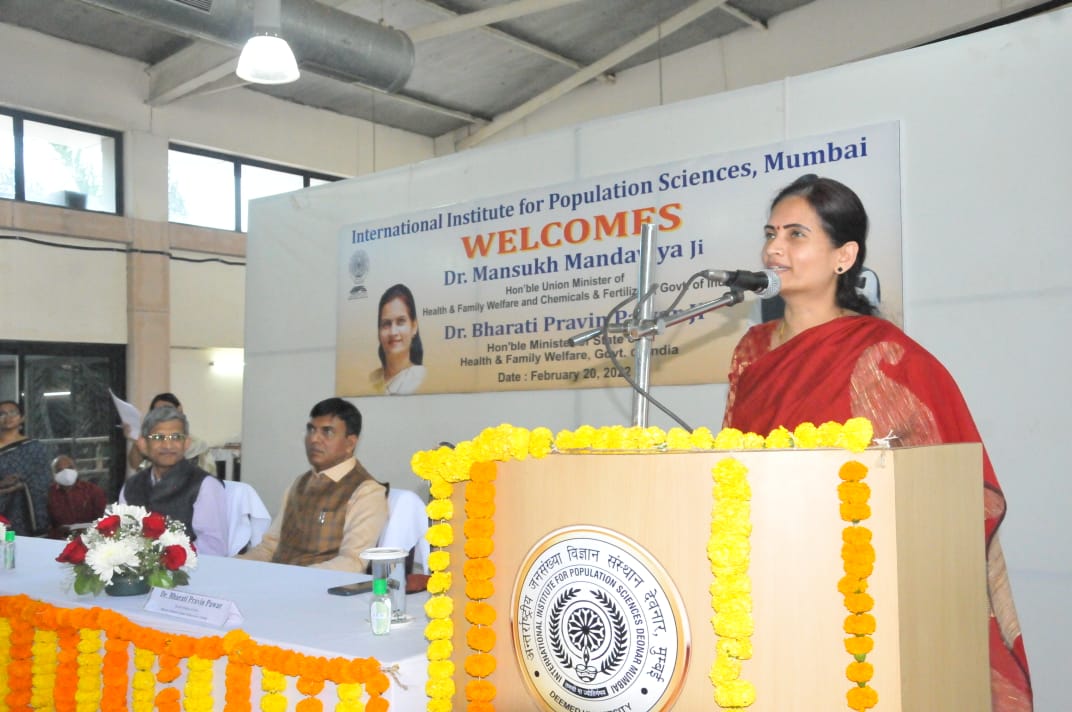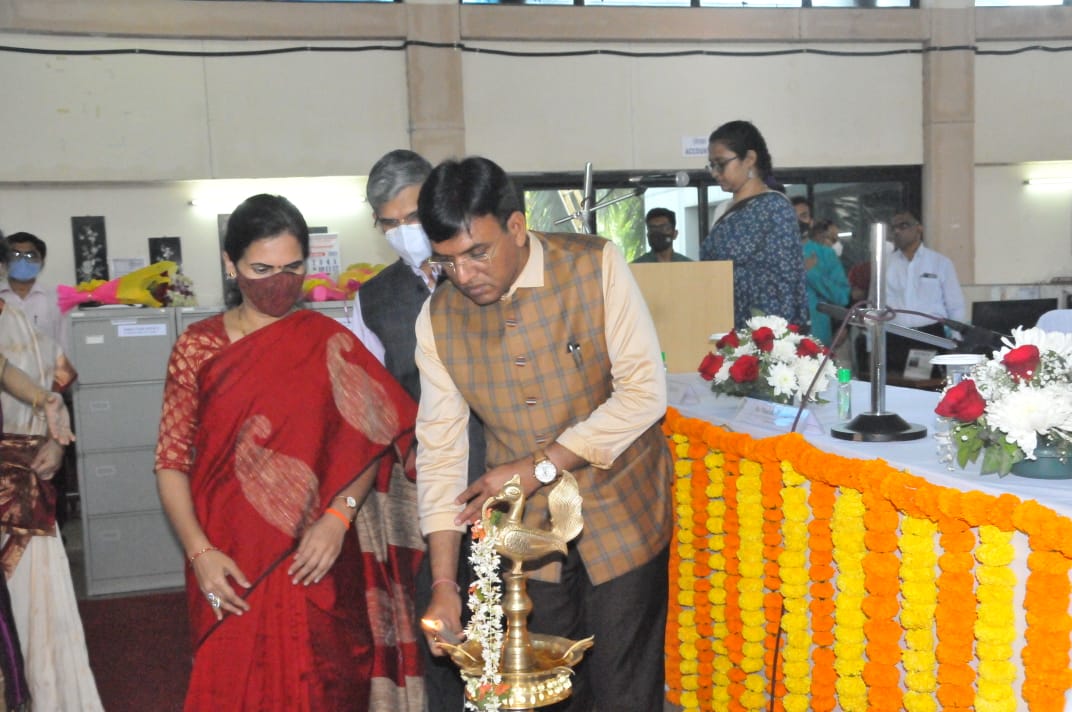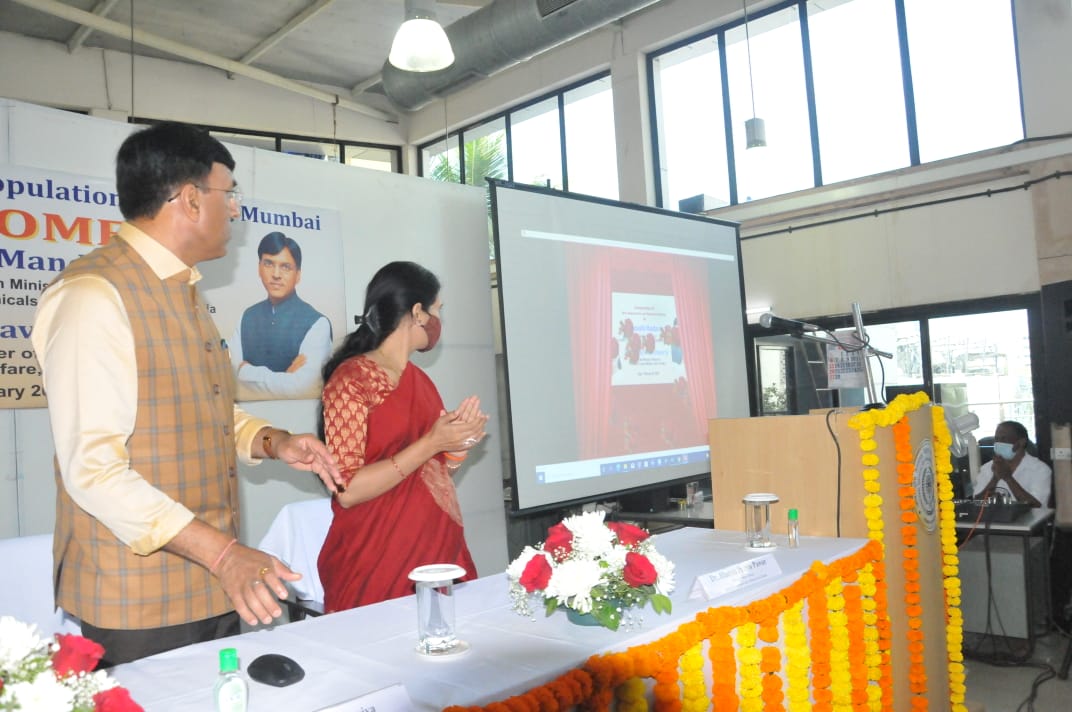: Mumbai, February 20, 2022
Union Health& Family Welfare Minister Dr. Mansukh Mandaviya and Minister of State for Health& Family Welfare Dr. Bharati Pawar inaugurated two new Departments and two new Research Centres at International Institute for Population Sciences (IIPS) in Deonar, Mumbai today. The newly inaugurated departments are ‘Department of Survey Research and Data Analytics’ and the ‘Department of Family and Generations’. The new Centres are called ‘Centre of Demography of Gender’ and ‘Centre for Ageing Studies’.
The new departments and centres will work in line with the vision of taking Indian institutions to global level and making the country self-reliant. The focus areas of these new departments and research centres are well-being of girl-children, women and the elderly population. Union Health Ministry had approved these departments and centres at IIPS from October 1, 2021.
At IIPS, Dr. Mandaviya said, India has huge population of 1.4 billion and so, using data analytics and artificial intelligence, we may be able to synchronise this huge data into metadata. International Institute for Population Sciences has the potential of broad segment analysis and preparing reports on these data, which will be useful not just for India but the world, said the Minister.
Dr. Bharti Pawar said that IIPS is playing a significant role in achieving the vision of making India Self reliant (Aatma Nirbhar). The data generated by IIPS helps legislators in policy-making. “The data of National Family Health Survey also shows there is need of more work in some districts and areas”, she said.



Department of Survey Research and Data Analytics: This Department is meant for developing newer methods of data collection. The focus will be on developing innovative methods for analyzing big data and building capacity of Indian students and professionals. It will look at developing AI and other scientific techniques for monitoring and ensuring the quality of data collected in household surveys. Machine–learning and spatial analysis may be applied for understanding key issues facing India. The department is likely to contribute to making the country self-reliant in technology related to survey research and data analytics.
Department of Family and Generations: This Department is meant for understanding the life course changes in relation to childhood, youth, adulthood and older age. The department will focus on the age-structural transition happening across the world in general and India, and its socio-economic implications. Thereby, they will evaluate the population and social welfare policies implemented by the Government of India from time to time. The department is likely to contribute to better understanding health and well-being at various stages of life course and better formulation of welfare policies for different sections of the population.
Centre of Demography of Gender: This Centre is meant for carrying out high-quality interdisciplinary teaching and empirical research on various aspects related to population, health and development in India and abroad. Developing gender related course curriculum which suits to the requirements of various stakeholders and capacity building, through tailor-made short-term courses is also an important agenda of the new Centre. The focus will be on providing timely policy inputs to the Central and State Governments and local administrative bodies for formulation of appropriate policies and programmes from time to time. This centre is likely to contribute to better understanding of survival, schooling, safety, etc. of girl children, better understanding of the health and well-being of women in India better formulation of welfare policies for people of different gender.
Centre for Ageing Studies: The Centre is meant for building scientific knowledge base on contemporary social, economic, psychological and public health issues facing ageing populations in India and elsewhere and disseminating this knowledge to the research community and policy makers, based on empirical evidence and scientific analysis, advising the governments in India and other organizations, including NGOs, on policy aspects, and monitoring and evaluation of ongoing welfare programs and social security schemes for elderly in India. This centre is likely to contribute to better understanding the long-term care systems for older people, suggesting ageing policies and welfare programmes for the older adults.
Know more about the new departments and centres of IIPS from here.

IIPS, an autonomous organization under the Union Ministry of Health and Family Welfare, is a premier teaching and research institute with a global recognition. The institute, a leader in survey research and data analytics in the country, has been the nodal agency conducting all the five rounds of National Family Health Survey.
***
SC/CP/PK
Follow us on social media: ![]() @PIBMumbai
@PIBMumbai  /PIBMumbai
/PIBMumbai ![]() /pibmumbai
/pibmumbai  pibmumbai@gmail.com
pibmumbai@gmail.com

